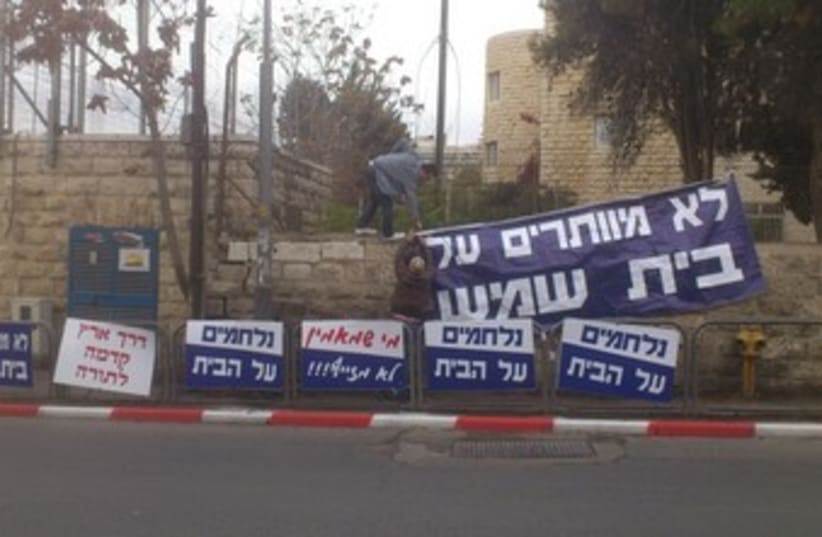The Supreme Court on Thursday heard arguments by lawyers for Attorney-General Yehuda Weinstein, Beit Shemesh Mayor Moshe Abutbul and his October 2013 challenger Eli Cohen over whether the lower court’s order for new elections should be upheld.
The Jerusalem District Court nullified the Beit Shemesh municipal elections and ordered new ones on December 26, on the grounds of massive and systematic fraud, and Abutbul appealed the decision.Weinstein and Cohen opposed the appeal, with Cohen arguing that the order for new elections should stand and that a reversal would be allowing an “attack on Israeli democracy.”Abutbul’s lawyer argued that ordering entirely new elections when Abutbul and his Shas party were not accused of wrongdoing, with the lower court blaming most of the fraud on the Koah Lehashpia party, was a “collective punishment.”He added that “new elections should be the last option” and that “throwing out an election would be fixing an injustice with an injustice.”Explaining in more detail the basis for overturning the lower court, Abutbul’s lawyer said that it had incorrectly said that the scope of the fraud and the size of the community involved meant that an estimated 1,400 votes could be disqualified, more than Abutbul’s razor-thin 956 winning margin.He said that the police had only a few hundred actual forged identity cards in hand, with the rest of the 1,400 being hearsay. He also noted that some of the identity cards found were not actually used to vote.The lawyer said that this was not a fact-question for which the Supreme Court might resist intervening, but was a clear legal issue, because the premise the court had made that it could, as he said, invent numbers like 1,400 based on generalities and without proof was legally defective.He attacked the lower court’s assumptions on the size of the communities that had participated in the fraud, claiming that the court overestimated the percentages of voters in general and the fraudulent voters in particular.Abutbul’s lawyer added that the lower court was wrong to limit the hearing to general arguments and documentary evidence with no calling or cross-examining of witnesses.He said that while he recognized that this was standard for an administrative proceeding on election issues, which is different from a full trial, the unprecedented nature of the Beit Shemesh case demanded a more careful examining of those witnesses providing evidence.The state and Cohen’s arguments were shorter, mostly relying on the arguments made by the lower court in its decision.It emphasized that the enormity of the fraud was too severe to allow the election results to stand and characterized Abutbul’s arguments as misplaced factual arguments – which courts are loath to reverse on appeal – dressed up in legal terminology.Cohen’s lawyer made a more impassioned display, saying that not only would allowing the fraudulent election results to stand be an attack on Beit Shemesh’s democracy, but also on “Israel’s democracy, on us, on all of us.”He warned that without new elections, a new “level of fraud is becoming the norm.”The lawyer said that the country must draw a line as though to declare that the fraud had grown “until here,” but not further.He also slammed viewing the election results merely as an exercise in arithmetic, saying that questions of democratic purity and legitimacy had to be an essential part of deciding the election issue.The election and its nullification drew national attention, with Shas chairman MK Arye Deri blasting the decision as unfair discrimination against Shas constituents.Assuming the new election decision is upheld, it is certain to set off a new round of conflict in a city mired by disputes between the supporters of the ultra-Orthodox Abutbul and Cohen, who represents a coalition of secular and religious-Zionist residents.If the order for new elections stands, Interior Minister Gideon Sa’ar will set the date for new elections – which must be within 120 days of the Supreme Court’s decision.The three-judge lower court panel – consisting of David Heshin, Moshe Sobel and Yigal Marzel – had said it agreed with Cohen and Weinstein that the elections were substantially deficient enough – practically a “fraud industry,” a planned and widespread phenomenon of fraud – such that a vote free of massive fraud could have yielded a different result.Noting that election day is supposed to “celebrate democracy,” the court said the “heavy shadow” over the process was such that democracy could be affirmed only by “returning the issue to the voter – so that he can have his say.”Weinstein implied before the lower court that the significant arrests and the 828 votes that had already been disqualified – for being problematic – was a big enough problem to endanger Beit Shemesh residents’ faith in their democracy and make them feel their democratic rights were being trampled.According to Weinstein, suspects in the fraud had said they knew of a “target” goal, of paying between 1,000 and 1,700 “enthusiasts” to vote in favor of Abutbul and his party’s slate, and had heard of a bag holding 500 identity cards to be used to vote illegally.Supreme Court hears arguments over fate of Beit Shemesh election
Abutbol: new elections are collective punishment; Cohen: fraud was attack on our democracy; AG: uphold lower court order for new elections.
